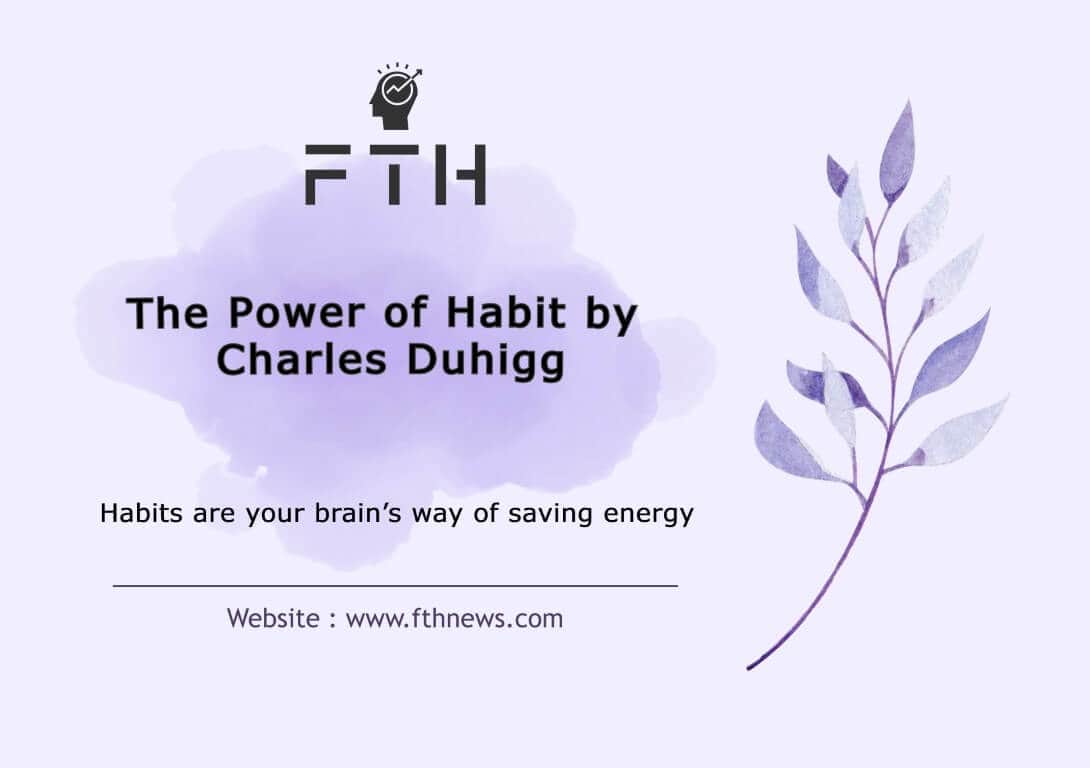
The Power of Habit by Charles Duhigg: A Life-Changing Summary
Power of Habit, Would you like to create new habits or get rid of your old bad habits?
Changing habits or creating new habits is a common challenge for all people in the world.
It can even be said that the secret of human success in work and life is to have good habits. The more good habits we have, the smoother our path to success will be.
Ray Dalio : Choose your habits well. Habits are the most powerful tool in your brain’s toolbox.
You are a collection of habits
You might be interested to know that a huge part of what we do every day has nothing to do with our willpower or brave decisions.
In fact, they are the result of habits that have been formed in us over the years.
These individual patterns have taken over our actions and decisions and made us what we are.
Here an even more interesting point becomes clear, and that is that if we want to become something other than what we are, we have to change our habits.
Understanding the Habit Loop
Duhigg introduces the concept of the “habit loop” as the core of his exploration. It consists of three key elements:
Cue: This is the trigger that initiates a habit. It could be a time of day, a specific place, an emotional state, or a certain person’s presence.
Routine: The routine is the behavior or action itself, which is prompted by the cue. It’s the habit you want to change or reinforce.
Reward: The reward is what your brain associates with completing the routine. It satisfies a craving and reinforces the habit loop.
By recognizing these components, you gain insight into how habits operate, making it possible to identify and modify them.
How do you create a new habit?
Build a farm to grow new habits This may not seem so complicated when it happens automatically.
Because your mind adjusts this complex process in the form of a mental pattern without realizing it.
But when you are going to do this yourself, you have to take several steps back, analyze your mind, and after discovering the way your mind transforms simple and complex behaviors into patterns, create new patterns for yourself.
The good news is that several scientists, philosophers and researchers have long sought to discover this great secret of the mind and have extracted it from the heart of thousands of hours of research.
Based on the results of this research in the book The Power of Habit, you must follow three rules to cultivate new habits.
Habits work in 3-step in Power of Habit book
- Cue ( Choose a specific task and do it ) cue, routine, reward
- Routine ( Repeat it as a continuous routine that will bring you a sense of passion and satisfaction )
- Reward ( Consider a reward for it )
Your mind loves new and simple tasks and avoids repetitive and complex tasks.
In fact, this is why it turns habits into specific patterns; Because he wants to save himself from the trouble of constantly analyzing complex tasks.
On the other hand, it doesn’t do it for free. If there is no prize involved, it never bothers to recruit millions of neurons to build a new pattern.
When it comes to the prize, you should not think of money or exotic things. Because your mind does not need material things at all.
The only thing that will make him accept something as a reward is how good it makes you feel.
Let me give you an example. Imagine that you want to establish the habit of exercising. As we said together, the first step for this is to create a specific lead. This clue should be something directly related to exercising. For example, you can put this clue in wearing sportswear. The next step is to come up with a feel for your exercise routine. The best thing to do is to use your sense of taste or smell and tie your routine to a taste or smell. For example, you can drink a glass of healthy cool drink with any flavor you like right after exercising and smile big afterwards.
The third and final step is the award. You can reward yourself with getting a body you’re proud of or even watching a show you love. Many of the rewards embedded in habits come over time. For example, a person who wants to lose weight using this system considers reaching his favorite size as his final prize. Therefore, after you tie your daily routine to a specific, happy feeling, you should immediately visualize and enjoy the ultimate prize. The more persistent you are in repeating this process, the stronger the habit will grow and the easier it will be for you to do.
How to change old habits?
The power of habit means changing old and troublesome habits such as smoking, overeating, and even skipping work, which is an important and decisive part of our lives.
For example, if we can eliminate the habit of smoking, we will experience a healthy life and a longer life. If we get rid of the habit of overeating, we will have a fit and healthy body, and if we get rid of the habit of not doing and abandoning things, we will see great improvements in our lives.
The thing you need to know is that habits never go away, they change.
This may be a little difficult for you to accept. For example, say: “How is it possible that the habit of smoking does not disappear? Does this mean that I will practically remain a person dependent on cigarettes for the rest of my life?”
Let’s take another look at the cycle of habit formation. We said together that habits are created during three steps; Creating specific clues, tying the daily routine to a sense and considering the ultimate prize.
To change an old habit you need to keep the cue and the reward and focus on changing the daily routine and the emotion attached to it.
In this way, you can save yourself from the trouble of bad habits. In fact, you’ve become addicted to the feeling of doing it consistently. If you find a way to create that feeling in a healthier way, you can control the behavior you want. But how? I will tell you.
The Habit Transformation Process
Identify the Routine: First, recognize the habit you want to change. What is the behavior you want to address? Be specific.
Experiment with Rewards: Once you’ve identified the routine, experiment with different rewards that satisfy the same craving. For example, if you’re trying to quit smoking, you might find that chewing gum or taking a brisk walk can provide a similar reward.
Isolate the Cue: Analyze what triggers the habit. Is it stress, boredom, a particular time of day, or something else? By identifying the cue, you can start to anticipate when the habit will occur.
Have a Plan: Finally, create a plan to replace the old routine with a new, healthier one. This plan should be specific, actionable, and tailored to the cues and rewards associated with the habit. Over time, with practice and persistence, you can establish a new, positive habit in place of the old one.
What factor or action turns on the key to doing the habit
For example, when do you want to take the pack of cigarettes out of your pocket and smoke? Or when you get the urge to eat high-calorie snacks?
Your first task is to identify this particular time or feeling. For example, you may find that when you feel worried, you crave sweets, or when you feel tired and anxious, you unconsciously reach for your pocket and look for your cigarette.
You may need to monitor yourself for a few days to identify this hidden key.
Report your progress to someone
Reporting your progress to others will help you stick to your habit-changing plan. Besides, when you report your work to others, it becomes more real to you. In the meantime, you can get the help of like-minded others to overcome the challenges of your path.
Believe that change is possible in Power of Habit
One of the factors that will kill your efforts to change your habits like an ax is the existence of false and debilitating beliefs.
When you believe that you will never get rid of your old habits, you give your biggest support force to the front of destructive beliefs and trap yourself in these habits.
Believing that changes are possible and that good days will come gives life to your legs to resist these habits.
You should not trap yourself in the fear that maybe after all this effort and self-control, you will return to your habit again. Have faith that the universe will respond to your efforts. In that case, your inner strength will help you in ways you don’t even think of, so that you can safely pass this stage and come out of the cocoon that you wrapped around yourself like a butterfly. Remember, your belief makes a truth.
So take your new steps with courage and believe that you can become a much better person because the power of belief is as effective as the power of habit.
What was the main message of “Charles Duhigg” in the book “The Power of Habit”?
- Change may not always be quick and easy, but with time and effort, almost any habit can be changed.
- The Golden Rule of Habit Change: You can’t break a bad habit, you can only change it.
- Your habits are what you choose them to be.
- Hiding what you know is sometimes as important as knowing it.
- According to scientists, habits are formed because the brain is constantly looking for ways to reduce effort.
- If we understand how habits work, we can change them.
- Changing any habit requires determination.
- The key to success is creating appropriate routines.
The Science Behind It:
Throughout the book, Duhigg presents compelling real-life case studies that illustrate the power of habit. These stories include the transformation of individuals, organizations, and even entire communities through an understanding of and deliberate changes to their habits.
For example, he discusses how a football coach turned a struggling team into a winning one by focusing on changing their habits and mindset. He also explores how companies like Procter & Gamble and Target use data-driven insights to influence consumer habits and boost sales.
Duhigg’s work is grounded in scientific research, including studies from psychology, neuroscience, and sociology. He makes complex concepts accessible to the general reader, providing a solid foundation for understanding why habits form and how they can be altered.
In summary, “The Power of Habit” is not just a book about the mechanics of habits; it’s a guide to understanding, changing, and harnessing the power of habits to improve your life, whether that means becoming more productive, healthier, or happier. It provides actionable insights and a roadmap for personal growth and transformation.
FAQ
Habit is actually a conscious and sometimes unconscious choice that makes us continue to do something without thinking – often every day – for example, we are used to eating in a certain way, walking in a certain way, in a certain style. Dress up and… In other words, a habit is a formula that our brain automatically follows.














